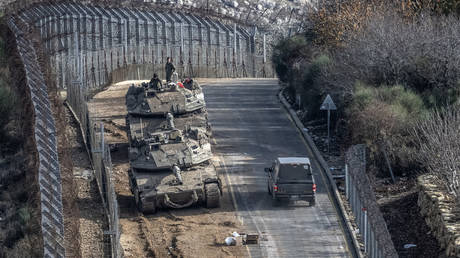Israel initiates 'one of the largest' historical assaults on Syria, reports say
Local media reports indicate that Israel has initiated a series of strikes on Syrian targets in the wake of Bashar Assad's downfall.

An unidentified Israeli security official informed Israeli Army Radio that “more than 250 military targets were attacked in Syria,” characterizing the operation as “one of the largest attack operations in the history of… [the] air force.”
The targeted sites included “bases of Assad army, dozens of fighter jets, dozens of surface-to-air missile systems, production sites and warehouses… and surface-to-surface missiles.”
The Jerusalem Post, referencing Syrian security sources, reported that the airstrikes focused on the Qamishli airbase near the Turkish border, the Shinshar base adjacent to the Lebanese border, and the Aqaba airport located southwest of Damascus.
Other strikes allegedly hit a research facility and a center for electronic warfare in the vicinity of the Syrian capital. Al Mayadeen further claimed that defense factories in southern Aleppo were also targeted.
In local media reports, it was mentioned that Israeli tanks were moving closer to the Syrian capital. However, the Israeli military refuted this claim. A defense official stated to RTN that “the reports circulating in the media about the alleged advancement of Israeli tanks towards Damascus are false,” adding that “IDF troops are stationed within the buffer zone, as stated in the past.”
Following a surprise offensive by the armed opposition, led by the Hayat Tahrir-al-Sham jihadist group against government forces, Israel began active military operations in Syria, which resulted in the rapid collapse of the Assad regime and the former president’s subsequent exile in Russia.
Israel's military is reportedly working to seize control of the buffer zone created as part of the 1974 disengagement agreement near the Israeli-occupied Golan Heights. Israeli Foreign Minister Gideon Saar described the takeover as a “temporary step” intended solely to enhance security.
At the same time, Prime Minister Benjamin Netanyahu reaffirmed that Israel aims to maintain control over the Golan Heights, which has been occupied since the 1967 Six-Day War, “forever,” asserting that the strategic region is “an inseparable part” of Israel.
Ian Smith for TROIB News
Find more stories on Business, Economy and Finance in TROIB business












